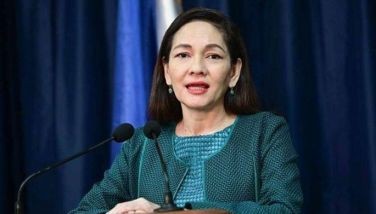Angara: Pinoy ‘TNTs’ may vote under absentee bill
February 1, 2003 | 12:00am
Even the TNTs (tago nang tago) or undocumented Filipinos abroad will be allowed to vote in future national elections under the proposed Overseas Absentee Voting Act of 2003, Sen. Edgardo Angara said yesterday.
Angara, chairman of the Senate panel in the bicameral conference committee, said the final draft bill gave the TNTs abroad the right to vote provided that they secure a Department of Foreign Affairs (DFA) certification that a Philippine passport has been issued to them.
Malacañang yesterday welcomed the passage of the Absentee Voting Bill by the House-Senate bicameral conference committee the other night.
The new measure allows up to seven million Filipino citizens overseas to vote in the May 2004 elections.
Most of the TNTs have lapsed passports and have no working permit from the Philippine Overseas Employment Administration.
Angara said, however, that only about three million of the seven million Filipinos overseas would qualify to vote under the terms of the proposed law.
"The four million are either citizens of other countries, or have no intention to return to the Philippines," he said.
The final report, hammered out after intense negotiations between the House and the Senate panels, said immigrants are qualified to register and vote, provided they execute an affidavit stating that they would return to the Philippines after three years.
"Of those qualified to vote, some 2 million would come from contract workers in the Middle East, Taiwan, Hong Kong, Japan and Singapore," Angara said.
Filipinos overseas would vote for president, vice president, senators and party-list only. They should register personally at the Philippine embassy or consulate not later than 280 days before the day of elections.
Voting should also be done in person, except for those in Canada, United Kingdom and Japan.
"We chose one country each in Asia, America and Europe, where there is a sizable number of Filipinos spread all over and there is an efficient mail system," Angara explained.
The Senate agreed to the House proposal that the rule of voting be done personally. Angara had earlier warned that requiring personal voting would make the law inoperative.
"We recognized the validity of the House argument that voting by mail might be prone to abuse because of the difficulty in identifying the voters. Perhaps, when we have a more reliable system of identification, we can make voting by mail as a rule," he said.
Absentee voters have 30 days before election day to cast their votes.
"This is a big gesture extended by Congress to overseas Filipinos to show that we want to maintain political and cultural ties with them," he said. – With Jose Rodel Clapano
Angara, chairman of the Senate panel in the bicameral conference committee, said the final draft bill gave the TNTs abroad the right to vote provided that they secure a Department of Foreign Affairs (DFA) certification that a Philippine passport has been issued to them.
Malacañang yesterday welcomed the passage of the Absentee Voting Bill by the House-Senate bicameral conference committee the other night.
The new measure allows up to seven million Filipino citizens overseas to vote in the May 2004 elections.
Most of the TNTs have lapsed passports and have no working permit from the Philippine Overseas Employment Administration.
Angara said, however, that only about three million of the seven million Filipinos overseas would qualify to vote under the terms of the proposed law.
"The four million are either citizens of other countries, or have no intention to return to the Philippines," he said.
The final report, hammered out after intense negotiations between the House and the Senate panels, said immigrants are qualified to register and vote, provided they execute an affidavit stating that they would return to the Philippines after three years.
"Of those qualified to vote, some 2 million would come from contract workers in the Middle East, Taiwan, Hong Kong, Japan and Singapore," Angara said.
Filipinos overseas would vote for president, vice president, senators and party-list only. They should register personally at the Philippine embassy or consulate not later than 280 days before the day of elections.
Voting should also be done in person, except for those in Canada, United Kingdom and Japan.
"We chose one country each in Asia, America and Europe, where there is a sizable number of Filipinos spread all over and there is an efficient mail system," Angara explained.
The Senate agreed to the House proposal that the rule of voting be done personally. Angara had earlier warned that requiring personal voting would make the law inoperative.
"We recognized the validity of the House argument that voting by mail might be prone to abuse because of the difficulty in identifying the voters. Perhaps, when we have a more reliable system of identification, we can make voting by mail as a rule," he said.
Absentee voters have 30 days before election day to cast their votes.
"This is a big gesture extended by Congress to overseas Filipinos to show that we want to maintain political and cultural ties with them," he said. – With Jose Rodel Clapano
BrandSpace Articles
<
>
- Latest
- Trending
Trending
Latest
Trending
Latest
Recommended






























